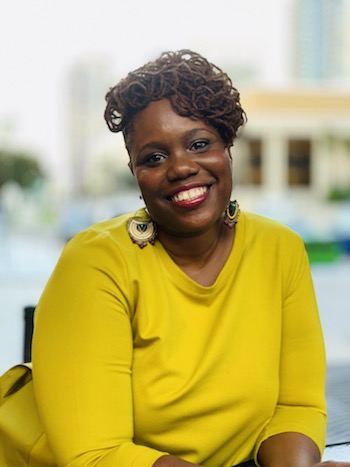USF associate professor helps curate hip-hop and rap collection for the Smithsonian Institute

From a young age, Aisha Durham surrounded herself with hip-hop and rap in her childhood home in Virginia. Her love for music was later combined with an interest in writing that led her to develop a passion in hip-hop feminism and resulted in a collaboration with the Smithsonian Institute.
As Durham explored more writing in high school and college, she expanded her work into hip-hop feminism in graduate school. This work caught the attention of the Smithsonian, earning her an invitation to work on its Anthology of Hip-Hop and Rap.
Durham, an associate professor of communication at USF, started working with the Smithsonian Institute in 2014 to create the Smithsonian Anthology of Hip-Hop and Rap, a multimedia collection that chronicles four decades of hip-hop and rap music and culture released Aug. 20.
The collection costs $159.98 and features 129 tracks on nine CDs and a 300-page book that includes essays and photographs from some of hip-hop and rap’s lead writers and critics.
“It has a CD compilation that basically chronicles hip-hop from it’s early inception in the late 70s, early 80s, from Bronx, New York, all the way to the contemporary moment,” said Durham.
The Smithsonian invited Durham to help with the project in 2014 because of the work she has completed in hip-hop feminism, including her 2007 book “Home Girls Make Some Noise!: Hip-Hop Feminism Anthology” and her 2008 publication “Between Us: A Bio-Poem.”
Durham experienced the birth and growth of hip-hop and rap within her own home before discovering her passion for writing hip-hop feminism.
Her ties to her brother, a DJ and producer, inspired her to join the project.
“I can tell you that my brother’s proud … I always tell him that I am the rhyme to his rhythm,” said Durham.
She said he allowed her to listen to his albums and the early beginnings of his mixtapes, which inspired her passion in hip-hop.
“I learned how to stylize words by listening to [novice] rappers. It was creative ingenuity, and just seeing how people put together ideas of words that marry with some of the other kinds of Black arts and poetry,” said Durham.
As a young writer, Durham did not originally associate her work with hip-hop, but she realized she wrote similar stories to those told in hip-hop songs.
“We’re talking about generations of people amplifying voices that are not necessarily heard,” said Durham. “That was my passion as a journalist, and that became my passion as a professor. I still talk about hip-hop and popular culture, but I also really think about the culture in the media by ordinary citizens.”
Durham said she connected to rappers while writing poetry in high school as she saw them as lyrical poets who expressed themselves through music.
“This is what hip-hop is at its core. It was an expression of Black and brown youth from working-class areas who did not have an official voice outside of their neighborhoods,” said Durham.
“It was a way to amplify the conditions and the experiences that they are having. I felt like I could do that too with poetry.”
Durham and a group of advisers were tasked to pick 100 songs out of a list of 900 provided by the Smithsonian Institute.
“We had to think about not just the aesthetic qualities of the sound, but [also] its significance in terms of its socio-political context, its resonance and speaking to particular issues impacting Black and brown communities,” said Durham.
The collection allowed Durham to be a part of a broader conversation about how struggling marginalized communities in the U.S. made hip-hop and rap culture.
“That’s saying a lot about how, within neighborhoods, the group of people who did not have a lot in terms of material possessions, basically created a culture that has transformed how we walk, think and talk in the world for more than four generations,” said Durham.
“I am glad to be a little part of that.”







